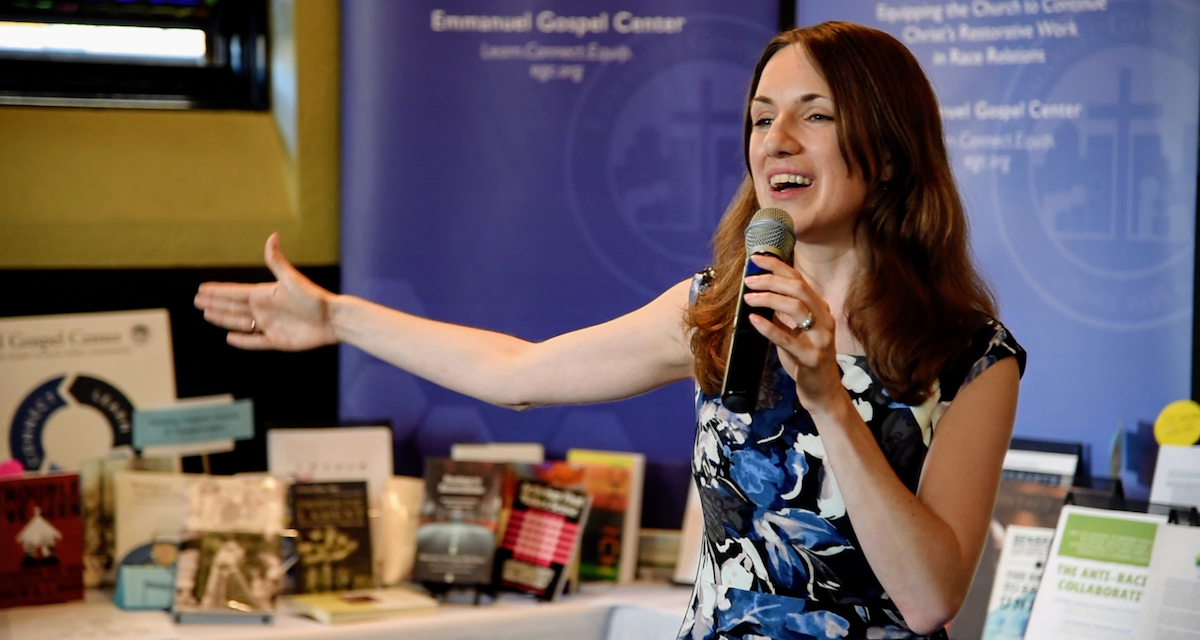Equipping White Evangelicals for Racial Reconciliation
When Megan Lietz ’09—director of the Emmanuel Gospel Center’s (EGC) Race & Christian Community Initiative (RCCI)—started her college career, she had no idea that she would launch a program that nurtures racial reconciliation amidst Boston church communities.
Raised in a rural community as a self-professed “white girl from the country,” the idea of racial reconciliation was not on her radar. But, during her time at Gordon, Lietz had several opportunities to become involved with diverse, urban communities.
As a student, she led a performing arts program for teenagers at a church in Lynn, MA, and lived and took courses in the city through the former Gordon in Boston program (GIB). Through GIB, she interned at Abundant Life Church (ALC)—a predominantly black church in Cambridge. After graduation, she worked for ALC for five years.
Through these immersive experiences, Lietz says, “I came to see and wrestle with issues related to race, culture, power, privilege and identity in ways I never had before. I came to see the privileges I have as a white person and the responsibility I have to work toward racial healing.”
The need and opportunity to equip white Christians to become better agents of racial reconciliation became clear to Lietz through her work at EGC. After two years of listening to community members of different races, ages and expressions of the Christian faith, Lietz created the Race & Christian Community Initiative (RCCI).
Today, a little more than a year since its launch, RCCI has two pilot programs: a cohort program and church partners program, says Lietz.
As a part of the cohort program, white evangelicals can improve their engagement with race-related issues by participating in a variety of reconciliation activities and study. RCCI’s initial focus on white evangelicals is intentional—because white evangelicals often encounter a steep learning curve when discussing matters related to race, Lietz explains. RCCI plans to develop a multiracial team, and, in time, expand services to better engage people of all racial backgrounds.
Lietz emphasizes that all cohort activities are reviewed by people of color who provide guidance and accountability for all of RCCI’s programs.
“As a white person, my personal blind spots and stake in the system makes me unable to tell if genuine progress is being made,” Lietz says. “As a result, I need the oversight of people of color and leading of the Holy Spirit to help me grow and participate in the work of transformation.”
With the first cohort’s conclusion, initial feedback has been very encouraging and Lietz is already working on refining and re-envisioning how future cohorts can grow and reach a broader audience.
One cohort alum shared, “I read the news differently. I listen differently. I look at and interact with people in crowds differently. I think about how I use my resources in a new way . . . I have a changed mindset and it affects everything.”
In addition to its cohort program, RCCI offers services to churches that want to participate thoughtfully in racial reconciliation in their own community. This includes things like providing Bible-based teaching, facilitating conversations, leading people in reflection and helping churches apply what they are learning.
“We’re sowing seeds,” Lietz says.“RCCI strives to nurture a community where people don’t just take reconciling actions, but embody and work toward reconciliation in all aspect of life.”
To learn more about RCCI or get involved with one of their programs, check out RCCI’s website or reach out to Megan Lietz directly at [email protected].
By Billy Jepma ’18, English language and literature, communication arts
 The Bell
The Bell